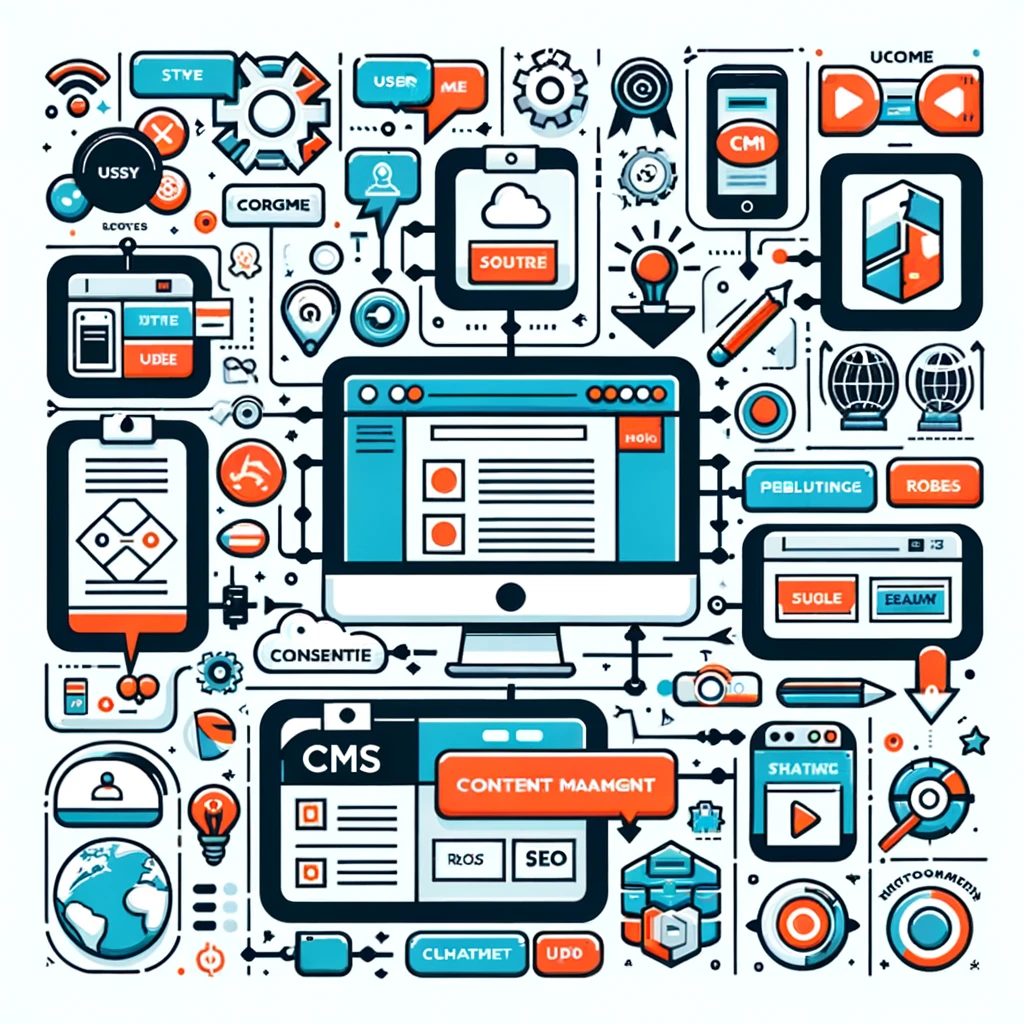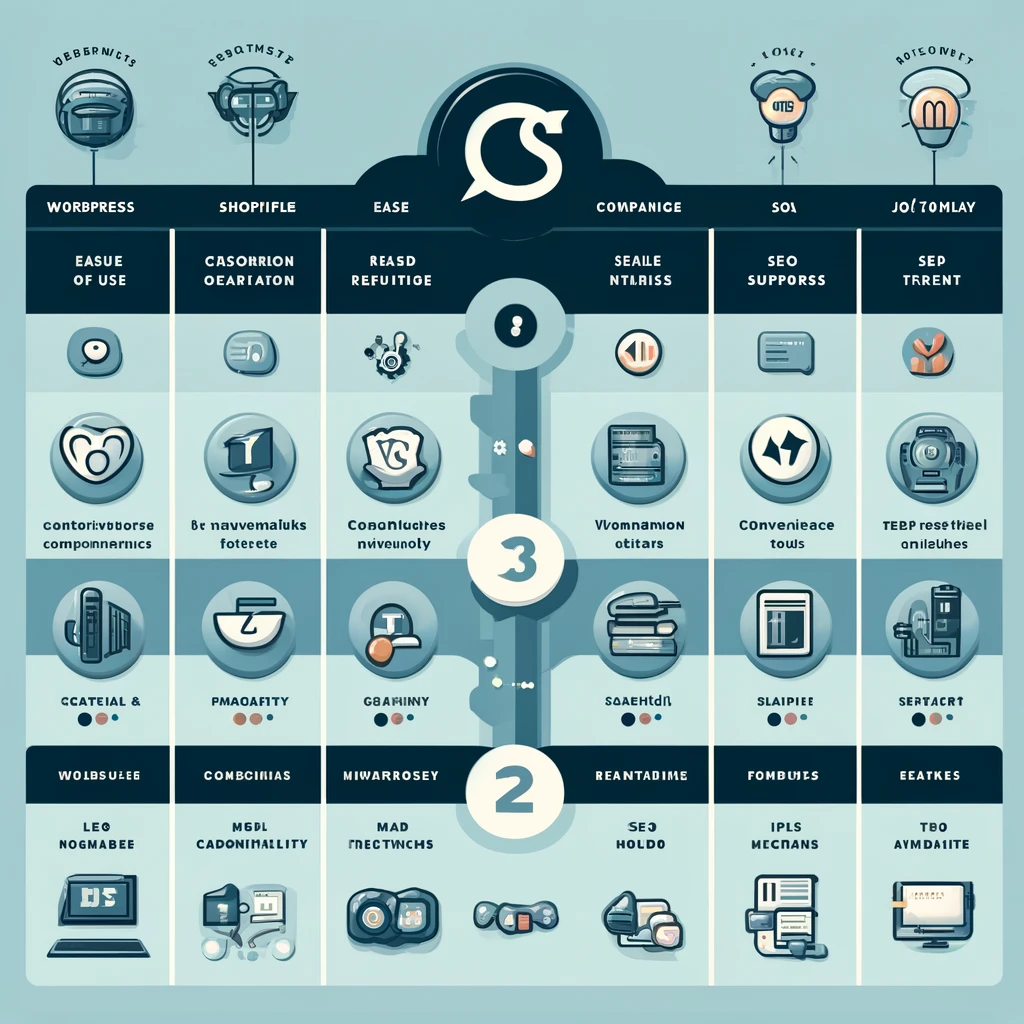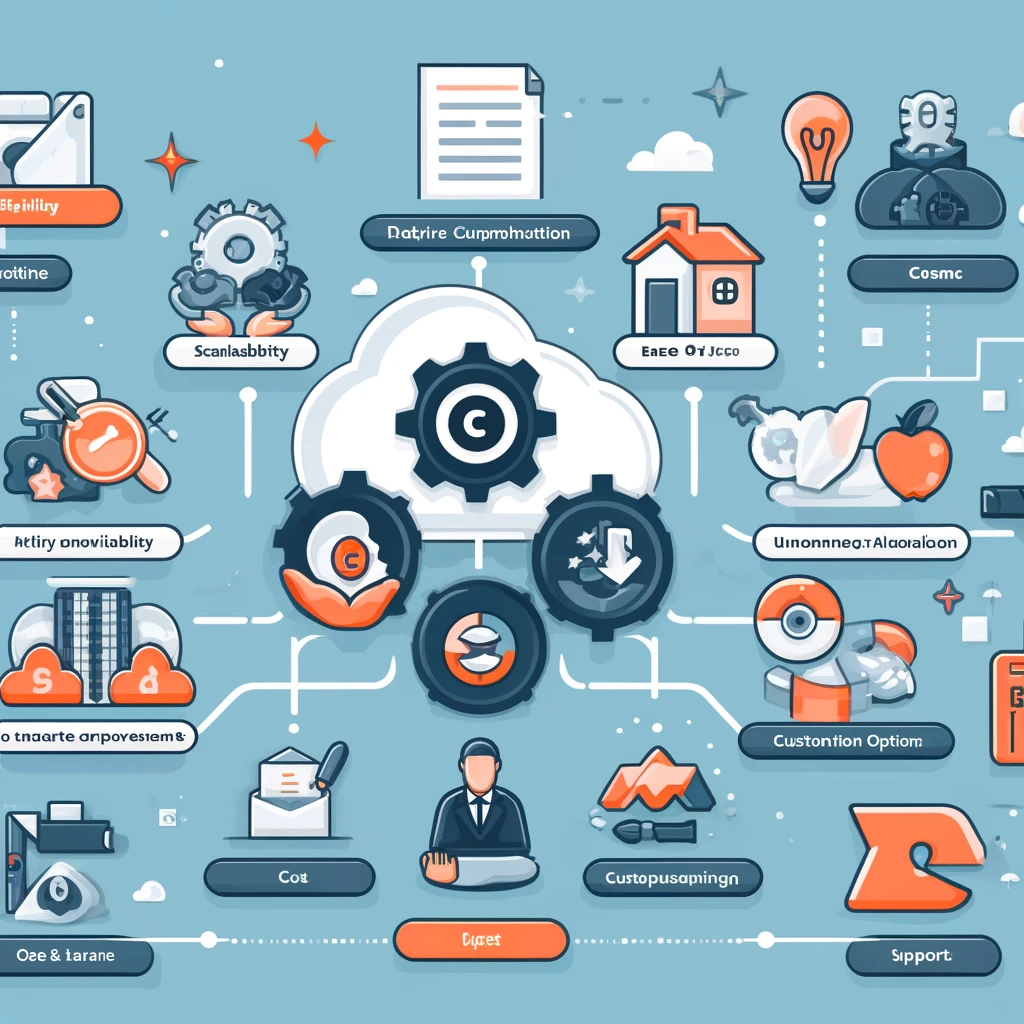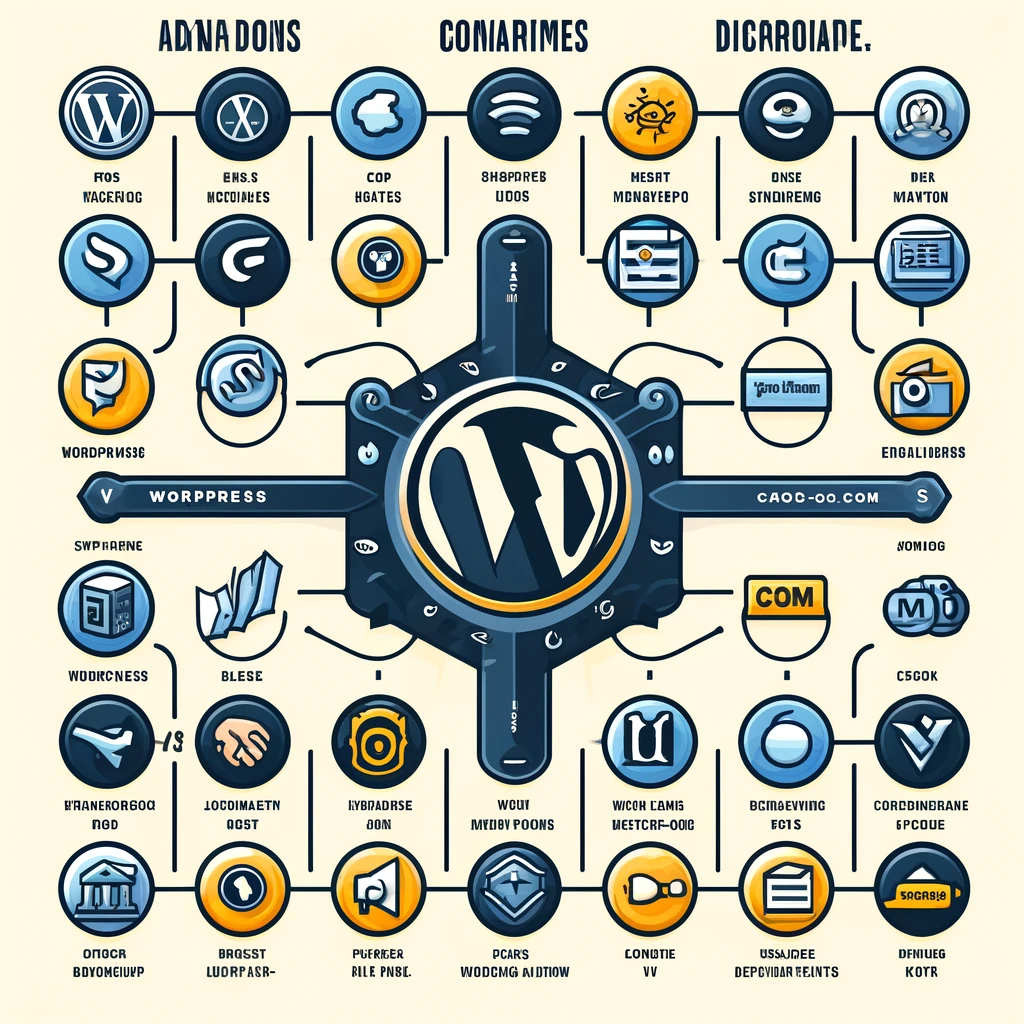Introduction

Welcome to the digital age, where the right tools can make all the difference in your business’s success! If you’re running a business in Columbia, one of the most crucial tools to consider is a Content Management System (CMS). Whether you’re setting up a new online store, launching a blog, or building a corporate website, choosing the right CMS is a foundational decision that will affect your business’s ability to grow and adapt in the online world.
What is a CMS? A Content Management System is software that helps users create, manage, and modify content on a website without the need for specialized technical knowledge. In other words, it’s what lies behind your website, making it run efficiently and allowing you to easily update it, no matter how tech-savvy you are.
Why Does It Matter?
- Ease of Use: A good CMS makes it simple to manage your content and website.
- Scalability: As your business grows, your CMS should grow with you, handling more traffic and more content without a hitch.
- Customization: Different businesses have different needs; your CMS should allow you to customize your site to fit your brand and functionality requirements.
- Support: Robust community support and professional help can make maintaining and updating your site much easier.
In this blog, we’ll dive into a comparative analysis of some of the most popular CMS platforms like WordPress, Shopify, and others, examining their features, usability, and how well they meet the specific needs of businesses in Columbia. Whether you’re a local café looking to expand online, a growing e-commerce startup, or a well-established enterprise considering a digital overhaul, understanding the strengths and limitations of each CMS will help you make an informed decision.
Stay tuned as we explore these platforms in detail, helping you pinpoint exactly which one aligns best with your business objectives and digital strategy.
What is a Content Management System (CMS)?

A Content Management System (CMS) is an essential tool for anyone looking to build and maintain a digital presence. At its core, a CMS is software that helps you create, manage, and optimize your website’s content without needing extensive programming knowledge. Think of it as the backbone of your website, where all your content lives and breathes.
Core Functions of a CMS:
- Content Creation: Allows you to create content easily, usually through a user-friendly interface, similar to writing in a word processor.
- Content Management: Provides tools to organize, modify, and delete content from a centralized platform.
- Publishing: Lets you publish content on your website with just a few clicks, and often includes options to schedule posts for future release.
- Presentation: Handles the layout and design of your content, ensuring it looks good on all devices without requiring you to code.
- SEO Tools: Most CMS platforms include built-in tools to help optimize your content for search engines, enhancing your site’s visibility.
Why Use a CMS?
- Efficiency: A CMS streamlines the process of web development and management, making it quicker and easier to keep your site updated.
- Accessibility: Enables non-technical users to easily update and manage a website.
- Scalability: Supports the growth of your business by making it easy to expand and update extensive amounts of content.
- Cost-effectiveness: Reduces the need for expensive technical development resources.
Table of Popular CMS Features:
| Feature | Description |
|---|---|
| User-Friendly Interface | Simplifies the creation and management of content. |
| Multi-User Environment | Allows multiple users to create, edit, and publish content. |
| Customizability | Enables modifications to fit specific needs and branding. |
| Extensibility | Supports plugins or add-ons to extend functionality. |
| SEO Optimization | Provides tools for enhancing visibility on search engines. |
A CMS can serve various types of websites, from blogs and portfolios to complex e-commerce sites and social networks. Whether you are a solo entrepreneur, a small business, or a large corporation, a CMS offers a flexible solution to manage your online presence effectively.
In essence, a CMS is your gateway to making web management an effortless task, allowing you to focus more on what matters most—engaging your audience and growing your business. As we move forward, we’ll delve deeper into comparing specific CMS platforms to help you determine which one best fits the unique needs of your Columbia business.
Comparison of Top CMS Platforms

Choosing the right Content Management System (CMS) is crucial for any business, especially when you’re looking to establish or enhance your online presence. Each CMS offers a unique set of features and capabilities, making some better suited for certain types of projects than others. Let’s take a closer look at some of the top CMS platforms—WordPress, Shopify, and Joomla—and how they stack up against each other.
1. WordPress
- Overview: WordPress is the world’s most popular CMS, known for its flexibility and extensive plugin ecosystem. It started as a blogging platform but has evolved to support all types of websites.
- Key Features:
- Vast array of themes and plugins
- Strong community support
- High customizability
- Best For: From blogs and small business websites to complex portals and online stores (with WooCommerce).
- Ease of Use: User-friendly, especially for bloggers and small to medium-sized websites.
2. Shopify
- Overview: Shopify is a leading e-commerce platform designed specifically for online stores and retail point-of-sale systems.
- Key Features:
- Integrated e-commerce capabilities
- Hosted solution (less technical hassle)
- Strong security for online transactions
- Best For: E-commerce businesses looking for an all-in-one solution with built-in sales tools and minimal setup.
- Ease of Use: Very user-friendly for setting up and managing online stores.
3. Joomla
- Overview: Joomla offers a middle ground between the developer-oriented extensibility of Drupal and the user-friendliness of WordPress.
- Key Features:
- Strong content management capabilities
- Good for social networking sites and e-commerce
- Extensive user permissions
- Best For: Websites that require complex data organization and have multiple content managers.
- Ease of Use: Steeper learning curve than WordPress but offers more built-in features.
Comparison Chart:
| Feature | WordPress | Shopify | Joomla |
|---|---|---|---|
| Ease of Use | High | Very High | Moderate |
| Customization | Very High | Moderate | High |
| Scalability | High | High | Moderate |
| Support | Extensive community | Dedicated support | Large community |
| SEO Tools | Excellent plugins | Built-in features | Good extensions |
| eCommerce | Via plugins (WooCommerce) | Native support | Extensions available |
Choosing the Right CMS:
- Consider your technical skills and resources.
- Evaluate your needs for e-commerce, scalability, and customization.
- Think about the long-term maintenance and support you’ll need.
Choosing the right CMS is about finding the best fit for your specific project requirements and your team’s skill set. Whether you’re prioritizing ease of use, robust e-commerce functions, or extensive customization options, each platform has its strengths and trade-offs. Understanding these can help you make an informed decision that aligns with your business goals and growth strategies.
Factors to Consider When Choosing a CMS

Choosing the right Content Management System (CMS) is a pivotal decision for your business, impacting everything from how you manage your website to how effectively you can grow and engage with your audience. Here are some essential factors to consider that will help guide your decision and ensure you select a CMS that aligns with your business needs.
1. Scalability
- Description: Your chosen CMS should be able to grow with your business. This means it must handle increased traffic and content without performance issues.
- Why It Matters: As your business expands, your CMS should be able to scale up to accommodate new users, more complex operations, or larger amounts of data without requiring a complete platform change.
2. Cost
- Description: Consider both the initial setup costs and ongoing expenses. Some CMS platforms are free while others charge a monthly fee. Also, factor in potential costs for add-ons, plugins, and custom development.
- Why It Matters: Budget constraints can significantly influence your choice of CMS, especially for small to medium-sized businesses.
3. Ease of Use
- Description: The CMS should be user-friendly, especially if you do not have technical staff. It should allow you to easily create, edit, and manage content.
- Why It Matters: A user-friendly CMS can reduce the time and resources spent on training and can increase efficiency in managing the site.
4. Support and Community Resources
- Description: A strong support network and a vibrant community can be invaluable, especially when issues arise. Check if the CMS has active forums, tutorials, and customer support services.
- Why It Matters: Good support ensures that help is available when you need it, minimizing downtime and potential disruptions.
5. Customization Options
- Description: The ability to customize your site both in terms of design and functionality is crucial. Look for a CMS with flexible templates and a wide range of plugins or extensions.
- Why It Matters: Customization is key to creating a unique brand identity and can significantly impact user experience and functionality.
6. Security
- Description: The CMS should have a good track record for security, regular updates, and active measures to protect against vulnerabilities.
- Why It Matters: Security breaches can compromise your data and affect your business reputation adversely.
Comparison Table of CMS Factors:
| Factor | Why It Matters | Things to Check |
|---|---|---|
| Scalability | Ensures the CMS can grow with your business needs. | Upgrade options, performance under load. |
| Cost | Affects your budget and ROI. | Initial costs, subscription fees, cost of add-ons. |
| Ease of Use | Impacts how quickly you can execute changes and updates. | User interface, complexity. |
| Support & Resources | Crucial for resolving issues and learning about the CMS. | Availability of forums, customer service, documentation. |
| Customization | Determines how well the CMS can adapt to your specific business needs. | Themes, plugins, API access. |
| Security | Protects your site from data breaches and hacks. | Security features, update frequency. |
By carefully weighing these factors against your business requirements, you can choose a CMS that not only fits your current needs but also supports your long-term digital strategy. Whether it’s handling high traffic volumes, offering extensive customization, or providing robust security measures, the right CMS will be a cornerstone of your online presence.
Pros and Cons of Each CMS

Choosing the right Content Management System (CMS) is critical for any business, and understanding the advantages and disadvantages of popular platforms like WordPress, Shopify, and Joomla can help you make an informed decision. Here’s a straightforward look at the pros and cons of these major CMS options to help guide your choice.
WordPress
- Pros:
- Flexibility: Highly customizable with thousands of themes and plugins.
- Community: Large support community with extensive documentation and forums.
- Cost-effective: Free core software with many free or low-cost plugins.
- Cons:
- Maintenance: Requires regular updates and maintenance to secure and manage plugins and themes.
- Performance: Can become slow with too many plugins or high traffic unless properly optimized.
Shopify
- Pros:
- E-commerce Integration: Built primarily for e-commerce with powerful tools and built-in features.
- Ease of Use: User-friendly interface designed for non-technical users.
- Security: Hosted solution that handles security compliance and updates.
- Cons:
- Cost: Monthly subscription fees can be higher, especially with additional apps and transaction fees.
- Less Customization: Limited customization capabilities compared to platforms like WordPress.
Joomla
- Pros:
- Powerful: Offers strong capabilities for managing and organizing extensive content.
- Extensibility: Good balance of power and usability with numerous extensions.
- Support for Multilingual Sites: Native support for multilingual content management.
- Cons:
- Complexity: Steeper learning curve than WordPress.
- Smaller Community: Fewer themes and extensions than WordPress.
Comparison Table:
| CMS | Pros | Cons |
|---|---|---|
| WordPress | Highly customizable, large community, cost-effective | Requires regular maintenance, can slow down with many plugins |
| Shopify | E-commerce ready, user-friendly, secure | Higher cost, limited customization |
| Joomla | Powerful, good content organization, multilingual support | Steeper learning curve, smaller community |
Final Thoughts:
- WordPress is ideal for those who need a versatile platform with strong customization capabilities, suitable for anything from blogs to complex business sites.
- Shopify is best for businesses that prioritize e-commerce and want a hassle-free platform with strong sales tools.
- Joomla offers a middle ground for those needing robust content management capabilities, especially useful for educational sites and portals.
By weighing these pros and cons against your specific business needs—whether it’s e-commerce functionality, ease of use, or extensive customization—you can select the CMS that best aligns with your strategic goals and operational requirements.
Conclusion

Choosing the right Content Management System (CMS) is a decision that can significantly influence the success and scalability of your online presence. As we’ve explored the different CMS platforms like WordPress, Shopify, and Joomla, you’ve seen that each has its unique strengths and potential drawbacks. The best choice depends on your specific business needs, technical capabilities, and long-term digital strategy.
Key Takeaways:
- Understand Your Needs: Whether it’s flexibility, ease of use, or robust e-commerce capabilities, understanding your primary needs is crucial.
- Consider the Future: Choose a CMS that not only fits your current needs but also has the potential to scale as your business grows.
- Community and Support: Consider platforms with strong community support and resources. Having access to help and updates can make or break your site’s effectiveness.
Decision-Making Table:
| CMS | Ideal for | Consider if You Need |
|---|---|---|
| WordPress | Flexible websites with custom features | Customizability, large range of plugins |
| Shopify | E-commerce businesses | Integrated sales tools, out-of-the-box e-commerce |
| Joomla | Complex content management | Advanced user management, multilingual support |
Final Thoughts: Making an informed decision about which CMS to use can set your business up for online success. It’s not just about choosing the most popular platform; it’s about finding the best fit for your specific business model and market demands. Engage with each platform’s community, try out demos, and consider your team’s technical expertise when making your choice.
Remember, the right CMS will help streamline your operations, enhance your marketing efforts, and provide a better experience for your customers. Here’s to building a dynamic, robust, and successful online presence that grows with your business!